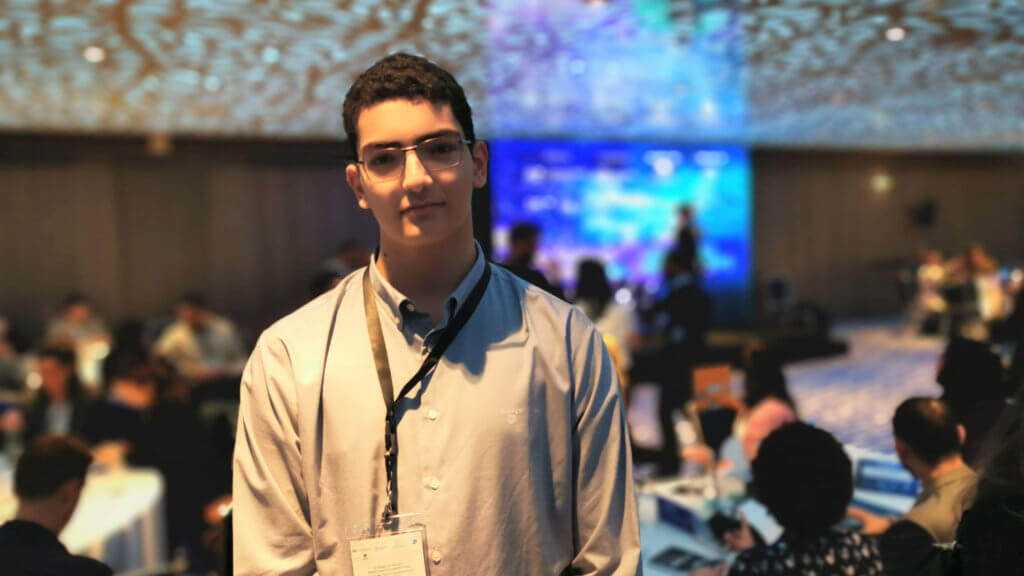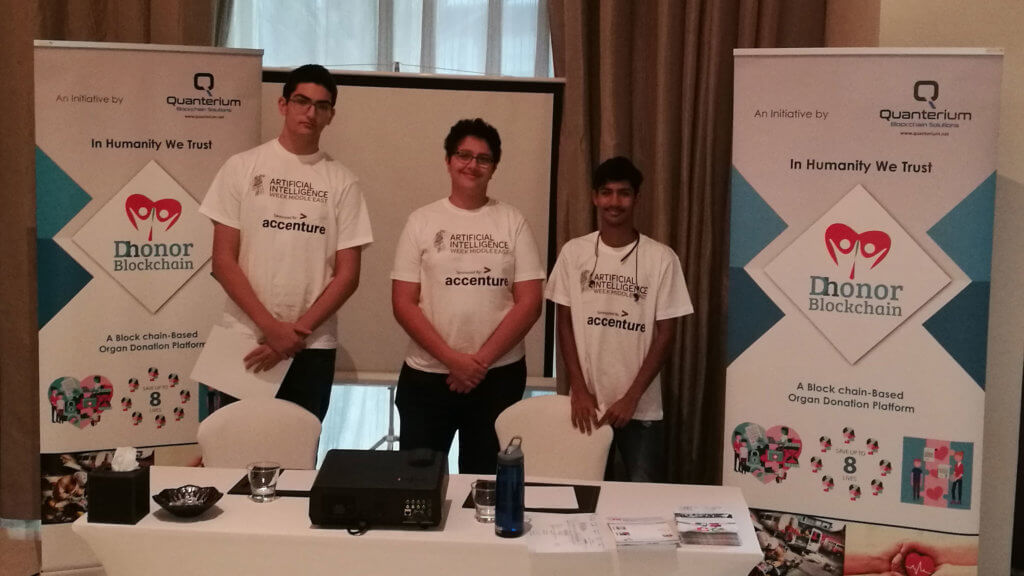How smart algorithms could change the process of organ donations around the world
Judith Hillen
Worldwide, hundreds of thousands of patients are waiting for organ donations. How can we improve the access to organs as well as the allocation of organs to increase the number of successful transplants?
This was the question that Ryan Merheby asked himself when he started developing the idea for his startup Dhonor at the age of 14. Now, Dhonor is led by Ryan with the help of his father, Wassim Merheby, and is incorporated in the tech startup Hub In5, located in Dubai Internet City. The first two phases of the solution have already been implemented and launched in partnership with the Ministry of Health and Prevention (MOHAP) in the United Arab Emirates. When Ryan turns 18, he will take ownership of the startup, which is also part of 5-HT’s digital health ecosystem.
 Ryan Merheby@MITEF Arab Startup Competition 2019
Ryan Merheby@MITEF Arab Startup Competition 2019In this interview, Ryan and Wassim Merheby explain how their waitlist, allocation, and provenance solution can not only help to improve the access to organs, but also identify the best match between donor and recipient while preventing organ trading or trafficking.
What are the current problems about organ donations around the world?
Ryan Merheby: Hundreds of thousands of patients are on the organ waitlist at any point in time, many dying before receiving a donation. The need for organs is exponentially outgrowing the rate of donations. Furthermore, it is estimated that 10% of organ transplants originate from organ trading or organ trafficking.
Wassim Merheby: This is in addition to the issue that accelerated access to organ donation saves governments and insurance payers the cost of treatment estimated at $5000 per patient per month on average. Considering that 300K patients are on waitlist and treatment plans globally, increasing the access to organs through effective registration and allocation systems will take a huge financial burden off healthcare systems worldwide.
How does Dhonor help to improve the access to donor organs?
Ryan Merheby: The Ministry of Health and Prevention (MOHAP) wanted to develop a system that eases the registration process for organ donors while also educating the donors and their families on the legal and religious guidelines pertaining to organ donation. Our solution makes it possible to register and authenticate donors remotely and allows donors to notify their family, thus solving issues that standard opt-in or opt-out systems could not resolve. Furthermore, the convenience of the registration leads to more donors, hopefully mitigating the current shortage of donations. In 2018, we were awarded a contract by MOHAP to develop the national organ donor registry called Hayat. Then in 2019, we were tasked with developing the national smart organ waitlist. Potential donors can register using the Hayat app – only needing their Emirates ID for verification.
What happens next – how does the donor organ find its way to a patient in need?
Ryan Merheby: Deceased individuals who are identified as donors have their consent verified and their immediate family notified of the donation. Only then are organs harvested and transferred to a specialized hospital for conducting transplantations. The organs are allocated by national committee doctors after reviewing the recommendations generated by the system. The priority parameters are histocompatibility, delivery time, previous medical conditions, and other exclusion parameters which determine the success score for the potential organ recipients. This process serves the purpose of reducing organ rejections by ensuring the organ donor and recipients are as good of a match as they can be.
How do you plan to prevent organ trading or trafficking?
Ryan Merheby: Preventing abuse and enslavement or even voluntary trading of organs is our long-term goal. To achieve that, we are planning to use DNA forensic (RNA prints) to identify the deceased source of organs. Before organs are collected from a cadaver, a swab sample would be taken and sent to a DNA sequencing lab that would share the DNA fingerprint. Similarly, when transplantation hospitals receive an organ, they need to do a sample swab and send it to a DNA sequencing lab. The result would be posted from the labs to Dhonor database that is a permissioned blockchain. The system will flag any DNA prints that do not match.
What are the advantages of applying blockchain technology?
Ryan Merheby: Blockchain technology ensures anonymity and security. Infiltration is far less common using the blockchain as its public key infrastructure prevents unauthorized changes to the data. Despite our preference for blockchain technology, the technical implementation of our system can vary depending on the needs of governments or health authorities in the countries looking to apply our solution.
Do Dhonor provenance and allocation solutions delay transplants?
Ryan Merheby: No, the process of provenance check is a deterrent. The identification happens in parallel and therefore does not delay the transplantation. The process requires a change in regulations banning harvesting or transplantation of organs unless a DNA swab is passed on cadaver and on received organs and sent to forensic labs for uploading to Dhonor blockchain. The identification takes exactly 5 seconds. As for the smart allocation system, it assists the doctors and health authorities to instantly check if the deceased person is a registered donor and allocate the organs after reviewing the AI recommendations. In that regard, it hastens the process of transplantation.
What is the story behind the foundation of Dhonor?
Ryan Merheby: The conception of Dhonor began when I was 14 years old. I was participating at an AI hackathon in the UAE where I presented my concept of a smart organ waitlist and allocation system. At that time, I didn’t plan to start a business, but among the panel judges was the Chief Innovation Officer of the Ministry of Health and Prevention who said the UAE would benefit from such a solution. We were awarded a contract to develop the national waitlist and national donor registry. Up to now, 2800 potential donors and 59 patients in need of organs have signed up, and six hospitals in the UAE are already connected to Hayat solution. Currently, we are working to expand the deployment of our system to neighboring GCC countries and to connect transplantation hospitals there with our service. Additionally, we are planning to release our allocation and provenance tools along with the Ministry of Health and Prevention in the UAE at Arab Health 2021.
 Ryan and Team @Artificial Intelligence Week Middle East 2019
Ryan and Team @Artificial Intelligence Week Middle East 2019How can Dhonor expand to the rest of the world?
Ryan Merheby: The Ministry of Health and Prevention is aiding us in our current expansion into the rest of the Gulf countries and into Northern African regions. These regions are our main goal now because we already have the necessary support, funding, and infrastructure. But we are also interested in bringing our solution to other African, Asian, or European countries. The further we expand, the more people we can help.
What are you hoping to achieve by being part of our Digital Hub?
Ryan Merheby: Being part of this network is very beneficial to us because it puts us on a stage and helps us get into the public. The more people are aware of the problems around organ donations, the more likely we are to establish efficient solutions worldwide. Being part of 5-HT will hopefully help us to get into contact with experts in organ donation to further improve our solution. We are also hoping to build connections with organizations that we could collaborate with, or with people who would like to support our vision. This will help us to ensure that we give the best service to people in need of organs worldwide.
5-HT Chemistry & Health Newsletter
Want the latest tech and industry news, events, relevant info from the ecosystem and more?
Subscribe to 5-HT Newsletter now Subscribe to 5-HT Newsletter now
Become part of the 5-HT Chemistry & Health
Exchange ideas with innovative startups and future-oriented companies in our ecosystem. We look forward to meeting you!